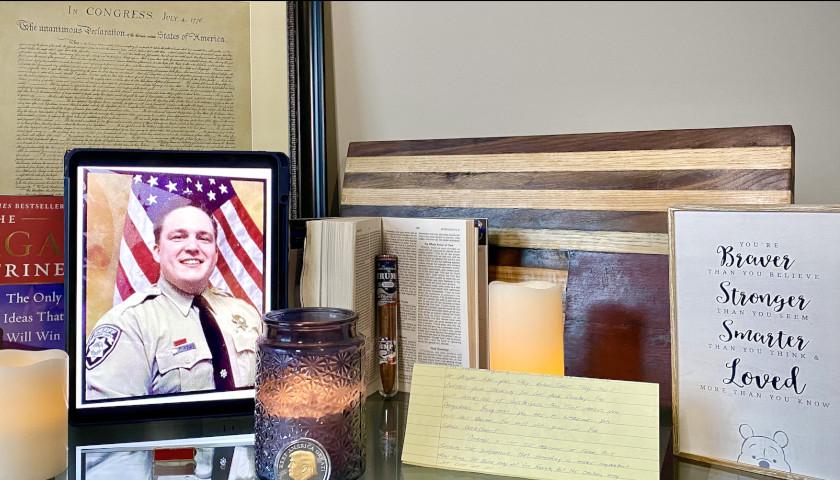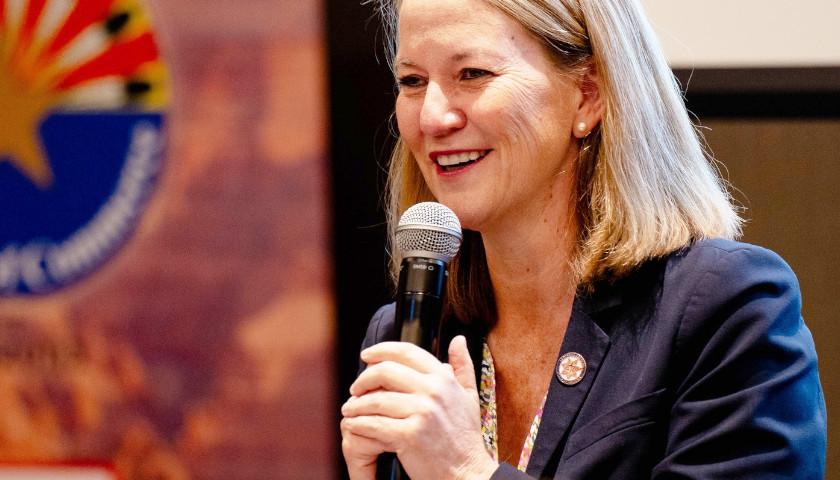In an emotional interview on Thursday’s episode of The John Fredericks Show, Tennessean Sarah McAbee joined guest-host Michael Patrick Leahy to share the disturbing journey of her husband, J6er and former Williamson County Deputy Sheriff Ronald McAbee.
In this in-studio interview, Sarah McAbee reveals new details about her husband Ronald McAbee’s arrest and subsequent imprisonment and discusses the daunting legal battle, the possibility of a 17-year prison term, and the devastating toll the prosecution has had on the couple.
Her experience inspired Sarah McAbee to found a nonprofit foundation aiding January 6 defendants and their families called Stand in the Gap.
Despite facing political reluctance, she remains steadfast in her pursuit of justice for her husband and others and urges all Americans to consider the ongoing human cost and broader implications for civil liberties in the United States caught in the aftermath of January 6.
TRANSCRIPT
Michael Patrick Leahy: Welcome back to The John Fredericks Show. Michael Patrick Leahy here sitting in for John today and tomorrow; we are broadcasting live from our studios in downtown Nashville, and we welcome here to our studio a fellow Tennessean, Sarah McAbee.
Good morning, Sarah.
Sarah McAbee: Good morning. Thank you for having me on.
Michael Patrick Leahy: Sarah, just for the background, your husband, Ronald McAbee, was at the Capitol in Washington, D. C. on January 6, 2021. He was arrested, has been in basically the Washington, D. C. gulag prison for 29 months, and you’ve only seen him, what, six times since?
Sarah McAbee: Yes, that is correct.
Michael Patrick Leahy: Tell us a little bit about your background and his. From what I’ve read, Ronald was a deputy sheriff for Williamson County here in Nashville, which is the suburb, suburban county just south of Nashville. And I guess you both grew up in Williamson County, is that right?
Sarah McAbee: Actually we’re from east Tennessee.
Michael Patrick Leahy: You’re from east Tennessee? Okay, and so where in east Tennessee are you from?
Sarah McAbee: Right outside of Knoxville.
Michael Patrick Leahy: Outside of Knoxville.
So you’re both from that area?
Sarah McAbee: Yes.
Michael Patrick Leahy: When did you get married?
Sarah McAbee: 2016.
2016. Do you have kids?
Sarah McAbee: No children.
Michael Patrick Leahy: No children. Married in 2016. When did you come to Williamson County?
Sarah McAbee: 2020.
Michael Patrick Leahy: 2020. And he got a job as Williamson County Sheriff’s deputy.
Sarah McAbee: Yes, he had been in law enforcement for seven years.
Michael Patrick Leahy: Okay, so he has a record in law enforcement.
Sarah McAbee: Yes, correct.
Michael Patrick Leahy: My understanding is that he was on a medical leave or something?
Sarah McAbee: Yes, he was in a car accident nine days prior.
Michael Patrick Leahy: Really? So nine – so the end of December 2020, he was in a car accident?
Sarah McAbee: Yes. He rolled his truck 12 times.
Michael Patrick Leahy: But he decided to go to January 6th – the rally on the mall that then turned into the riot, if you will, at the Capitol. Did you go with him?
Sarah McAbee: I did not.
Michael Patrick Leahy: You did not. Why did he go?
Sarah McAbee: Because he believed the election was stolen, and he wanted to air his grievances.
Michael Patrick Leahy: Did you at all have any concern about him going up there at the time?
Sarah McAbee: I did simply because he was in the car accident just prior to that, and him being a law enforcement officer. He doesn’t like big crowds, but he wanted to go because he had never heard President Trump speak before, and he wasn’t sure if this was gonna be the last time that he would hear him speak.
Michael Patrick Leahy: Okay, so this is January 6th; he’s at the rally on the mall.
He walks to the Capitol, and this is sort of where the controversy comes. There is a videotape of he was caught in this hallway where Roseanne Boylan was. And Roseanne had health issues. And I guess was either trampled to death or had a– she died.
Sarah McAbee: She did.
Michael Patrick Leahy: And he attempted to render aid to her.
I’ve watched the video, and it looks like he’s attempting to render aid to her. There’s other Capitol Police officers there. One of the Capitol Police officers fell down. It looks like he’s trying to protect him.
But January 6th happened.
When was he arrested?
Sarah McAbee: August 17th of 2021.
Michael Patrick Leahy: August 17th of 2021. Okay.
So what happened after January 6th?
Sarah McAbee: He came home. He told me exactly what had happened. I had seen it unfold on TV, and right after that, he called me to tell me what happened, and he told me that this woman died, and I was like, I know I saw it on TV, and he was like, ‘No, no, no, I never went inside. There was another woman that died.’
And for the longest time, nobody had any information on Roseanne, and it finally came out and the story, of course, was corroborated with video evidence. And so, you know, I was thinking he was coming home on January 7th and would be awarded some sort of medal or honor for helping Capitol Police in trying to render aid to a woman.
And instead, the FBI raided our house, and they apprehended him.
Michael Patrick Leahy: When did you have the first indication that he was under suspicion?
Sarah McAbee: Well, a lot of people were on the FBI wanted list at the end of January, but it was like they were just taking pictures of people on video. And so we never really thought anything of it until I got the phone call from the FBI on the 17th saying they had apprehended him.
So they called you. Yes, I was not at home. So that morning I had been traveling for work, and I was trying to get a hold of him, and he wouldn’t answer his phone. And so I was starting to get a little bit worried, but he was at work.
Michael Patrick Leahy: So he’s working as a Williamson County Sheriff.
Sarah McAbee: No, so he had left at that point
Michael Patrick Leahy: Where was he working?
Sarah McAbee: He was at a logistics company. He was an accountant. And so they apprehended him in the parking lot. He never even went into work that day.
And so after they had taken him into custody, they had called me and said, we’re about to raid your home. And so I have about an hour and a half of video of them raiding our house.
Michael Patrick Leahy: What’s that feel like?
Sarah McAbee: They destroyed my house, and they left it.
Michael Patrick Leahy: They destroyed your house.
Sarah McAbee: They did. They, they even took our–
Michael Patrick Leahy: Hold it, hold it, hold it. They knew where your husband was, right?
Sarah McAbee: They already had him in custody. And he told them where everything was that they were looking for.
Michael Patrick Leahy: Well, what were they looking for?
Sarah McAbee: Fourteen items. They took what he was wearing that day. They took a book of his. They took his laptops and his cell phone. And they took our front porch flag.
Michael Patrick Leahy: They took your front porch. Why did they take your front porch flag, your American flag?
Sarah McAbee: It was an American flag, yeah.
Michael Patrick Leahy: Why did they take it?
Sarah McAbee: For evidence, which they never used in trial.
Michael Patrick Leahy: What was the evidence? He’s a patriotic American?
Sarah McAbee: I guess he didn’t have it on him that day.
Michael Patrick Leahy: Okay, so they take him, they transport him where?
Sarah McAbee: He was held in Kentucky.
Michael Patrick Leahy: Held in Kentucky. Until when?
Sarah McAbee: He was held in Kentucky for about two months, and then he was held in Oklahoma for a short period of time, and then he made his way to D.C.
Michael Patrick Leahy: Did he have an opportunity to post bail?
Sarah McAbee: So a middle district judge in Tennessee granted him bond, but the government appealed it, and that’s when it went to Washington, D. C., and they have denied him bond ever since.
Michael Patrick Leahy: He’d been denied bond. What are the charges that were brought against him?
Sarah McAbee: He had seven felony charges ranging from trespassing to civil disorder, and the largest one was assault because every time he went to pick up that officer, they charged him with assault.
Michael Patrick Leahy: When he went to pick up an officer. Now, I’ve looked at the video. First, you said something interesting, Sarah, that he was never actually in the Capitol.
Sarah McAbee: Correct.
Michael Patrick Leahy: There’s a video of him in a tunnel.
Sarah McAbee: Yes.
Michael Patrick Leahy: Where is that tunnel?
Sarah McAbee: The Lower West Terrace Tunnel.
Michael Patrick Leahy: And it was very crowded.
Sarah McAbee: Yes.
Michael Patrick Leahy: And Roseanne Boylan was there also.
And I think it was when she collapsed when whatever the confrontation began. Is that right?
Sarah McAbee: Chaos broke out; yes.
Michael Patrick Leahy: Chaos broke out. And there are some reports that a Capitol Police officer used her nightstick to beat her as she was dying.
Is that true?
Sarah McAbee: That is correct.
Michael Patrick Leahy: And you’ve seen that?
Sarah McAbee: Yes.
Michael Patrick Leahy: Now, I’ve seen a video of your husband, and he used some salty language in communicating with both the protesters and the police officers, but to my vision of this, it looked like (a) he was attempting to render aid to Ms. Boylan, who was in the process of dying; and he was attempting to protect a Capitol Police officer who’d fallen down – and there were other protesters there who were kind of, like, aggressively either throwing things or trying to get after the Capitol Police, your husband stood in the way of those folks, right?
Do I have that right?
Sarah McAbee: Yes, that is correct.
Is there a video of him interacting in a negative way? Like they claim, he attacked a police officer.
Sarah McAbee: Yeah, so when he was trying to help Metropolitan Police Officer Andrew Waite, who was on the ground, another officer, Carter Moore, came up to him and struck him across the ribs and the shoulder with a baton.
And he simply threw his hands up in an open-faced fashion and pushed the officer away, and said, “I’m helping.”
That is another assault charge.
Michael Patrick Leahy: Who was the officer that beat–
Sarah McAbee: Who is the officer that hit my husband? It’s Carter Moore.
Michael Patrick Leahy: Carter Moore.
Sarah McAbee: Yes.
Michael Patrick Leahy: And I think that’s what I saw.
I saw a nightstick hit your husband, and then I saw him basically, as you described, put his hands up.
Sarah McAbee: He put space. That’s what they’re taught to do. Everything that he did that day is what they are taught to do as a law enforcement officer.
Michael Patrick Leahy: So, what was his bond set at originally by the middle Tennessee district judge?
Sarah McAbee: So there is no money tied to bond. That’s, that’s bail. So in federal court, it’s just bond that you have stipulations, and there were just stipulations that he had to have a job and couldn’t be on social media, that sort of thing.
Michael Patrick Leahy: And the government appealed this?
Sarah McAbee: Yeah, the government appealed it, and it went to Emmett Sullivan in Washington, D.C., and Emmett Sullivan called him a terrorist on record within five minutes.
Michael Patrick Leahy: Emmett Sullivan is a bad judge.
Sarah McAbee: Yes, he was removed from the case due to his comments.
Michael Patrick Leahy: So your husband, now, has been in prison since August of 2021. You’ve seen him six times.
Sarah McAbee: Yes.
Michael Patrick Leahy: Is he in a federal prison or in a Washington, D. C. prison?
Sarah McAbee: No, Washington, D. C.
Michael Patrick Leahy: We hear that those jails in Washington, D. C. are, you know, like gulags.
Sarah McAbee: They absolutely are.
Michael Patrick Leahy: Have you been to one?
Sarah McAbee: Yes.
Michael Patrick Leahy: Describe it for us.
Sarah McAbee: Well, one, the guards aren’t American. They hardly speak a lick of English. They’re literally from Africa.
And it’s disgusting when they literally had a pet rodent that lived in their dorms. The bugs. The cleanliness and the water that comes out, and it’s gotten better over the three years of them being there. But you know, for two years, they weren’t allowed to see their loved ones. That’s why I’ve only seen my husband six times, because they literally – I say they kidnapped them.
We weren’t allowed to lay eyes on them to even make sure that they were physically okay. It was a year and a half before I saw my husband, and that was behind glass.
Michael Patrick Leahy: How’s your husband doing?
Sarah McAbee: One day at a time.
Michael Patrick Leahy: One day at a time.
So let’s talk about his legal representation. Does he have a public defender? Does he have an attorney, private attorney?
Sarah McAbee: So we had private attorneys, and he was in jail for a year and a half, and a well-known attorney in D.C. looked at me and said, ‘Sarah, what are you doing? You’re paying for a private attorney. It’s costing you a lot of money, and you’ve drained your bank accounts, you’re gonna sell your house, you know, and your husband’s still sitting in jail.’
Michael Patrick Leahy: You sold your house?
Sarah McAbee: Yes.
Michael Patrick Leahy: In order to pay this private attorney?
Sarah McAbee: Yes.
Michael Patrick Leahy: How much have you paid this private attorney, in total?
Sarah McAbee: Well, in total, because it’s very expensive to have a loved one incarcerated, I’ve probably spent over $150,000 to $200,000 since he’s been incarcerated.
Michael Patrick Leahy: Now, the attorney that you hired – I think I’ve read that he probably hasn’t done the best job for his defendants.
Is that right?
Sarah McAbee: I believe he has taken on too many cases.
Michael Patrick Leahy: Got it. So, you spent 150, 000. You sold your house?
Sarah McAbee: Yes.
Michael Patrick Leahy: Where do you live now?
Sarah McAbee: I still live in Williamson County.
Michael Patrick Leahy: But do you have an apartment, or you rent a house?
Sarah McAbee: Yes, I rent a house.
Michael Patrick Leahy: That’s just – it’s devastating. I mean, you work all your life to own a house.
Sarah McAbee: Yeah.
Sarah McAbee: Yeah, we had a beautiful house. We finished building a house in 2020, and you know, I lived in it for two years by myself and it was, it was just a lot. You know, people don’t understand the financial burden of having somebody incarcerated.
So we had a private attorney for a year and a half, and this other attorney was like, ‘What are you doing? You haven’t even got a trial yet and you’re going to have to pay even more and he’s going to be found guilty. There’s a 99.6 percent conviction rate right now.’
So I fired our private attorney, and I got a public defender who is much better.
Michael Patrick Leahy: The public defender is doing a better job than private.
Sarah McAbee: One hundred percent. Even the judge sang his praises.
Michael Patrick Leahy: Now, but having said that, I think your husband did plead guilty to a couple of charges. Is that right?
Sarah McAbee: He did.
So he had seven charges in total, and when he shoved that officer, technically, that is an assault charge. I don’t believe cops should be above the law, and you should be able to protect yourself.
Michael Patrick Leahy: In other words, what they’re saying is, this police officer hit him with a baton, and he shoved him back to say, ‘Hey, leave me alone. I’m trying to help’ that they’re claiming, technically, that is an assault charge.
Sarah McAbee: So he said, ‘Yes, I shoved that officer after he hit me,’ but he didn’t plead guilty to any of the other charges.
Now, he was found guilty by a D.C. jury in October.
Michael Patrick Leahy: How fair was that trial?
Sarah McAbee: Not fair at all – the prosecution sent back evidence into the deliberation room that was never admitted into court.
Michael Patrick Leahy: How did that happen?
Sarah McAbee: They sent it back there. There was–
Michael Patrick Leahy: But that’s a violation of our due process.
Sarah McAbee: It is. It should have been a mistrial, and it wasn’t.
The judge asked the jury to come back in and to–
Michael Patrick Leahy: The judge allowed this to happen.
Sarah McAbee: He didn’t know what had happened.
Michael Patrick Leahy: The judge didn’t know?
Sarah McAbee: Yeah, so the jury had sent a note in and said, ‘Hey, something’s wrong here.’
So we had come back in, and we had filed for a mistrial, and the judge was like, ‘Well I’ll bring the jury back in and ask them to unsee what they saw.’
Michael Patrick Leahy: Yeah, that’ll work.
Sarah McAbee: That worked out real well.
Michael Patrick Leahy: So he’s gonna be sentenced?
Sarah McAbee: Yes, he’ll be sentenced in February.
Michael Patrick Leahy: What do you think the sentence will be?
Sarah McAbee: To be honest with you, I don’t know. We have a pretty, even though the January 6 trials are unfair, this judge has been pretty fair.
Michael Patrick Leahy: Who is this judge?
Sarah McAbee: Judge Contreras.
Michael Patrick Leahy: Contreras. Okay.
Sarah McAbee: But we know the government’s gonna ask for 14 to 17 years.
Michael Patrick Leahy: What?
Sarah McAbee: Yes.
Michael Patrick Leahy: Will he get credit for the 29 months he served?
Sarah McAbee: Yes.
Michael Patrick Leahy: Okay. So, I think what needs to happen here is Donald Trump needs to get re-elected.
Sarah McAbee: Absolutely
And on the second day in office, he needs to pardon your husband.
Sarah McAbee: That would be the hope.
Michael Patrick Leahy: 14-17 years.
Sarah McAbee: Yes
Michael Patrick Leahy: These guys are totally without any sense of fairness – any fair play – at all. And they’re basically trying to destroy your life.
Sarah McAbee: They absolutely are.
Michael Patrick Leahy: And your, your husband’s life. You have set up a group. You’re the executive director of a group called Stand in the Gap.
What does that group do?
Sarah McAbee: Stand in the Gap is a nonprofit foundation that assists January 6th defendants and their families. So, our sole focus right now is on visitation. We pay for families to go visit their loved ones that are incarcerated. And because defense attorneys aren’t working in this district court, we are funding appellate attorneys for the defendants to take their cases to the circuit court.
Michael Patrick Leahy: Stand in the Gap Foundation is www.standinthegap.foundation.
Sarah McAbee: Yes.
Michael Patrick Leahy: How are you doing financially?
Sarah McAbee: You know, it was the holidays.
Michael Patrick Leahy: Is it rough?
Sarah McAbee: Oh, it absolutely is. For a long time, I was working two and three jobs because people don’t understand that not only you lost an income in your family, you’re now having to pay for them to eat, to be clothed, to go see them.
So it is another thing that you have to add to your budget.
Michael Patrick Leahy: How can people help you?
Sarah McAbee: We have a GiveSendGo, givesendgo.com/macbee, and that helps him personally with books and commissary, and for me to be able to go see him.
Michael Patrick Leahy: When was the last time you saw him?
Sarah McAbee: I saw him on his birthday, which was the beginning of December.
Michael Patrick Leahy: Beginning of December? And describe that visit.
Sarah McAbee: It was a good visit. It’s good just to lay eyes on him and see him, how he’s doing. Physically, mentally.
Michael Patrick Leahy: I mean, were you separated by glass? Or were you–
Sarah McAbee: No. In this facility I am now able we have to sit six feet across from each other. Six feet?
Yes. And we can visit for an hour.
Michael Patrick Leahy: I mean, you and I are like, three feet apart right now.
Sarah McAbee: Yeah.
Michael Patrick Leahy: That’s amazing. And so, for one hour, you saw him.
Sarah McAbee: Yes.
Michael Patrick Leahy: Has he lost weight?
Sarah McAbee: Yes, he’s lost about 60 or 70 pounds.
Michael Patrick Leahy: Sixty or 70 pounds.
Sarah McAbee: Yes.
Because the food is — so you talked about how terrible this gulag is. They’re fed rice and beans for dinner every night, a bologna sandwich for lunch, and a hard-boiled egg for breakfast.
Michael Patrick Leahy: And that’s it.
Sarah McAbee: Yes, that’s why they have to live off their commissary.
Michael Patrick Leahy: Oh, so I mean that’s barely survivable.
Sarah McAbee: It is. It’s inhumane. You talk about their constitutional and civil rights being violated on all aspects.
Michael Patrick Leahy: Is there anybody in the Republican Party who is championing your husband’s case?
Sarah McAbee: No.
Michael Patrick Leahy: Why not?
Sarah McAbee: Because it’s January 6th. It’s too political. They don’t want to touch it.
They won’t even call me back.
Michael Patrick Leahy: They won’t call you back?
Sarah McAbee: No. Our own representatives.
Michael Patrick Leahy: We’ll see what we can do about that.
We’ll make some phone calls a little bit after this and see if they will have some conversations.
Well, Sarah McAbee, we wish you the best and we wish your husband the best, Ronald.
And there are people in America – most people in America – who are standing with you.
Thank you so much for joining us today, Sarah.
Sarah McAbee: Thank you for having me on.
Michael Patrick Leahy: We’ll be back with more. You’re listening to The John Fredericks Radio Show. My name is Michael Patrick Leahy. I’m guest-hosting for John and we’ll be doing so tomorrow, as well.
We’ll be right back with Mike Benz of the Foundation for Freedom Online to talk about more government skullduggery.
Back after this.
– – –
Listen to The John Fredericks Show from 5am – 9am and The Tennessee Star Report with Michael Patrick Leahy from 11am to 1pm weekdays on WENO AM760 The Flame.
Photo “Ronald McAbee” by GiveSendGo.




